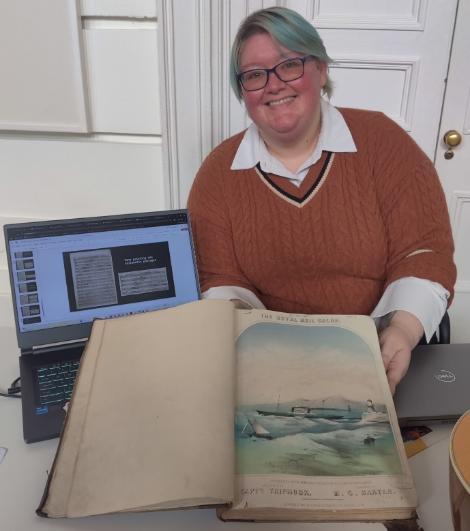| Code | MAEMUS |
|---|---|
| Duration | 1 Year Full-time, 2 Years Part-time |
| Teaching Mode | Full-time, Part-Time |
| Qualifications | MA |
| NFQ Level | Level 9 |
| EU Fees | Full-time: €8,100
Part-time: €4,700 See Fees and Costs for full details. |
| Non-EU Fees | €18,500 |
| Closing Date | Rolling deadline. Open until all places have been filled. Early application is advised. |
| Non-EU Closing Date | Open until all places have been filled or no later than 15 June. Early application is advised. |
| Start Date | 7 September 2026 |
Course Outline
Ethnomusicology is the study of people making music ... (J.T.Titon)
Our Ethnomusicology programme embraces global musical traditions—old and new, sacred and secular, professional and amateur—and places strong emphasis on musical performance, extended fieldwork, and community engagement.
Learning is grounded in building relationships with musical communities and in hands-on music-making. Students explore performance as research, and applied ethnomusicology encourages advocacy and public engagement.
The programme combines scholarly depth with practical training, including ensemble and individual performance, ethnographic methods, and interdisciplinary research.
Final research projects may take the form of dissertations, performance-led enquiries, audiovisual work, or educational resources.
Programme Details
The MA in Ethnomusicology may be taken full-time over 12 months or part-time over 24 months from the date of first registration for the programme.
Part-time: The part-time option will be taught during weekday working hours over two years. The course structure for part-time students is subject to agreement with the Department of Music.
The MA consists of 90 credits as follows:
Part I (60 credits)
- MU6050 Performance Studies (10 credits)
- MU6004 Performance Practice (15 credits)
- MU6030 Research Skills (5 credits)
- MU6034 Multidisciplinary Debates in Musicology and Ethnomusicology (5 credits)
- MU6042 Ethnography of Music (10 credits)
- MU6043 History and Theory of Ethnomusicology (10 credits)
- MU6047 Music Cognition and Perception in Culture (5 credits)
Part II
- MU6006 Research Project (30 credits)
Learning Outcomes
On successful completion of this programme, Ethnomusicology students should be able to:
- Demonstrate improved knowledge and understanding of the history of ethnomusicological theory and methodology;
- Demonstrate an understanding of fieldwork theory and methodology and apply this knowledge in the course of ethnographic research and representation;
- Apply theories of performance in critical and creative to musical performance;
- Demonstrate improved skills in musical performance, improvisation, and creativity across a range of music genres and repertories;
- Demonstrate improved skills in written and oral presentation of ethnomusicological concepts and methods (Diploma students);
- Demonstrate the competence to carry out an independent research dissertation (Master’s students).
Postgraduate Diploma in Ethnomusicology (NFQ Level 9, Major Award)
Candidates who pass at least 60 credits of taught modules may elect to exit the programme and be awarded a postgraduate Diploma in Ethnomusicology.
Academic Programme Catalogue
See the Academic Programme Catalogue where you can search for the complete and up-to-date content for this course. Note that the modules for all courses are subject to change from year to year. For complete descriptions of individual modules, see the Book of Modules.
Course Practicalities
Teaching is delivered in seminars, ensemble classes, workshops, tutorials, and one-to-one supervision. Contact time ranges from 8–12 hours weekly, depending on ensemble and workshop involvement in supervision. Some modules involve additional learning beyond class hours, such as rehearsals, performances, and fieldwork.
Assessment
Assessment is fully continuous and includes written work, presentations, performance assessments, and participation.
Who teaches this course
Our teaching staff from the Department of Music at UCC include:
- Dr. Michalis Poupazis (Programme Coordinator)
- Professor Jonathan Stock
- Dr Alexander Khalil
- Kelly Boyle
- Dr Jack Talty
- Lijuan Qian
Also supported by a wider team of instrumental and vocal tutors, covering Irish traditional music, Indian classical music, jazz, popular music, and Javanese and Balinese gamelan, amongst others.
Why Choose This Course
The MA in Ethnomusicology at UCC is a leading programme in Europe and beyond. It centres on historical and theoretical disciplinary and multidisciplinary foundations, performance, collaborative fieldwork, and most importantly the creative application of musical knowledge.
Students are encouraged to engage in applied ethnomusicology and draw on disciplinary insights from folklore, anthropology, sound studies, cultural studies, and performance.
The programme is delivered by a vibrant team of scholars and performers in a Department where all musical traditions are treated with equal value.
Staff includes world-renowned figures such as Professor Jonathan Stock, and a wider team involved in field-based, interdisciplinary, and performance-led research.
Skills and Careers Information
Graduates go on to careers across the creative arts, cultural heritage, education, and media sectors.
Many continue to doctoral research in Ireland or internationally.
Others work as professional musicians, arts educators, curators, community facilitators, or arts administrators.
Some graduates have also transferred the world music performance skills developed on the programme into tutoring roles with younger or emerging musicians.
The programme cultivates research fluency, performance expertise, intercultural communication, and academic and professional adaptability.
Requirements
You will have a Second Class Honours Grade II in a primary honours Arts degree (NFQ, Level 8), or equivalent, in music or a related subject (e.g. anthropology, folklore, cultural studies). Applicants with an appropriate professional equivalent (e.g. professional musicians of high standing, music media professionals) will also be considered under Recognition of Prior Learning (RPL). All applicants will be required to attend an interview with members of the programme team and may be required to pass a qualifying test.
For Applicants with Qualifications Completed Outside of Ireland
Applicants must meet the required entry academic grade, equivalent to Irish requirements. For more information see our Qualification Comparison page.
International/Non-EU Applicants
For full details of the non-EU application procedure visit our how to apply pages for international students.
- In UCC, we use the term programme and course interchangeably to describe what a person has registered to study in UCC and its constituent colleges, schools, and departments.
- Note that not all courses are open to international/non-EU applicants, please check the fact file above. For more information contact the International Office.
English Language Requirements
Applicants who are non-native speakers of the English language must meet the university-approved English language requirements. Visit our PG English Language Requirements page for more information.
Fees and Costs
The EU fee for this course is Full-time: €8,100 Part-time: €4,700.
The Non-EU fee for this course is €18,500.
Postgraduate EU and International Fees 2026/2027
See our Postgraduate EU and Non-EU (International) Fee Schedule for the latest information.
Deposits
If your course requires a deposit, please note that booking fees and deposits are non-refundable in all cases.
How can I pay?
See different options on our How Do I Pay My Fees? page.
Any questions? See the 'Contact Us' section on the Fees Office page.
How To Apply
1. Check dates
Check the opening and closing dates for the application process in the yellow fact file boxes at the top of this webpage. The UCC online application portal usually opens around mid October.
2. Gather documents
Scanned copies of supporting documents have to be uploaded to the UCC online application portal and include:
- Original qualification documents listed on your application, including transcripts of results from institutions other than UCC.
- Any supplementary items requested for your course, if required.
3. Apply online
Apply online by clicking the red 'Apply Now' button below. Note most of our courses have a non-refundable €50 application fee.
Any questions? Use our web enquiry form to contact us.
Additional Requirements (All Applicants)
Please note you will be required to provide additional information as part of the online application process for this programme. This will include the following questions:
- You may enter the details of professional or voluntary positions held. We strongly encourage you to complete this section with all relevant work experiences that will support your application.
- In addition to your previously declared qualifications, please outline any additional academic courses, self-learning, and professional training relevant to this programme.
- Please describe your motivation and readiness for this programme.
- Please detail your research interest(s).
- Please enter the names and email addresses of two referees.
The closing date for non-EU applications is Open until all places have been filled or no later than 15 June. Early application is advised.
Apply Now

-482x643.jpg)
